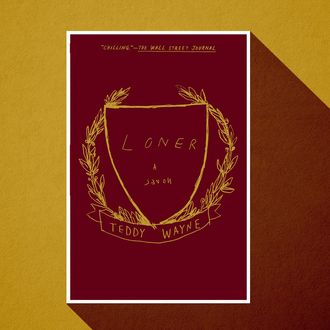
Teddy Wayne’s 2016 novel, Loner, is a disturbing and disturbingly prophetic look into the evolution of toxic masculinity. It follows David Federman, a freshman at Harvard in the late 1990s who is smart yet socially obtuse, and who above all feels entitled to lose his virginity. Now Loner is in early development at HBO, with the author set to write the pilot for the drama and to serve as co-executive producer. We talked to Wayne about the upcoming adaptation.
Since Loner came out incels have gotten a lot of media coverage. Would you describe David Federman as an incel?
Although he shares some characteristics with them, that would imply that he belongs to some sort of community of like-minded individuals. I always viewed David as a true loner, completely adrift, and the kind of guy who wouldn’t join any club that would have him as a member. And once you label someone — even a person like David whom you’d be tempted to slap a number of negative labels on — it reduces his or her complexity, which may be personally satisfying, but doesn’t make for very good fictional treatment.
Ask Louis C.K. or any slightly misogynistic comedian: College campuses just aren’t cool anymore because they’re so PC in the wake of #MeToo. Will the series address this?
Colleges have become even more of America’s ground zero for the culture wars the last few years, after both #MeToo and Trump’s ascendancy. It’s an interesting subject to explore, especially since, despite its storied literary tradition, there haven’t been all that many TV campus dramas to date.
What are some key changes from the book to the TV adaptation? Any significant revisions or additions?
Many more people would see the show than read the novel?
What’s it like to revisit the characters you first created years ago?
Having revised the book so many times, I’d become somewhat desensitized to it by the time it came out, so when people told me they found it disturbing, it was no longer the case for me. I wrote Loner as a feature-length script before it found a home at HBO, and in adapting various parts of it to a visual medium, I felt myself getting newly unsettled. I can see why my wife didn’t want her relatives to read it.
Does being a new father change your perspective on the characters at all?
The issues the novel raises about how young men grow up in this country were on my mind before my son was born, but mostly in the sociological abstract. It’s now more personal, and though he’s under 1 year old, I see how the culture is already trying to shape his identity, and I’ve become more concerned about those forces when he’s older and the stakes are higher. Among the many privileges men have long enjoyed is the freedom not to have to think critically about their gender. If Loner is to have any positive social impact, I hope it will be to interrogate these attitudes and values — in a nuanced, non-after-school-special way that neither regurgitates facile orthodoxies nor lets anyone off the hook — and encourage men of all ages to question them.

